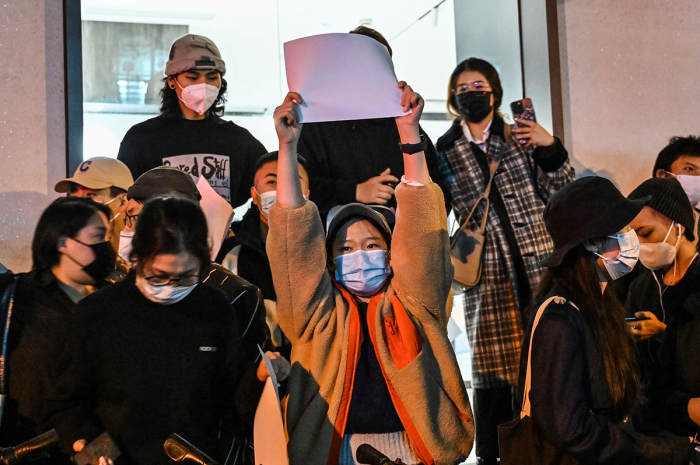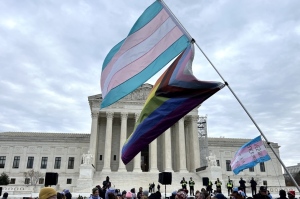Apple made a 'mistake' appeasing Chinese Communist Party by limiting AirDrop feature, senator says

Apple made a "mistake" by limiting a key communicative feature on iPhones that has helped activists in China circumvent censorship weeks before mass protests erupted over COVID lockdown orders, Republican Sen. Lindsey Graham said Wednesday night.
In an interview with Fox News, the South Carolina senator said that the California-based tech giant has caved to China by updating its iOS 16 global operating system on Nov. 9 to limit the AirDrop function. The function allows users to share files through a wireless connection that is out of the reach of internet content moderators. The change only applies to iPhones in mainland China.
"So, you have got Apple threatening to take Twitter out of the Apple Store and at the same time doing the bidding of the Communist Party, restricting sharing of information to people who are trying to protest," Graham said.
"I think we have got it backwards here," he added. "And I think what drives this is just money and market share."

Graham warned that "corporate appeasement of the Chinese Communist Party is pretty rampant," as the country has over 1 billion potential customers.
"I like Apple. They are a great American company, but the Chinese Communist Party writes the rules of the road," the senator said. "And to do business in China, you either leave the customer base or you follow their lead. ... I think this is a mistake."
Apple updated its iOS 16 global operating system so that Chinese iPhones can only be set to receive AirDrop messages from everyone for 10 minutes before switching off. The change does not appear to apply anywhere else in the world.
The change came weeks before mass protests erupted over China's COVID-19 policies following a fire at a high-rise in the Xinjiang region that killed 10 people last week, with many blaming COVID restrictions for contributing to the deaths.
Apple did not immediately respond to The Christian Post's request for comment.
As Quartz reported Sunday, protesters have used the AirDrop feature to spread messages and share literature on college campuses due to China's strict internet control.
An example of China's online censorship is when the government restricted online references to banners hung over a bridge in Beijing critical of President Xi Jinping, who was recently reelected to a third term.
Although China censored online references to the banner, Vice reports that pictures of the banner were shared with many in public places, such as the Shanghai subway, via AirDrop.
Apple has attempted to reduce its reliance on Chinese manufacturing, according to Quartz. However, the market research firm Canalys reported last month that iPhone shipments to China increased by 36% from last year.
The report found that 16% of smartphone shipments in China last quarter were iPhones. In addition, the Chinese company Vivo accounted for 20% of iPhone shipments, making it the market leader.
As The Christian Post reported, Xi Jinping's reelection has raised concerns among religious freedom advocates. The reelection came after the National Congress of the Chinese Communist Party abolished the two-term limit for presidents that had been in place for more than three decades.
This is not the first time Apple has come under fire for limiting communication channels in China.
Last October, Apple removed a Bible app and a Quran app after Chinese officials said they violated the country's laws on hosting religious texts. In a statement, the company cited its human rights policy, claiming: "We're required to comply with local laws, and at times there are complex issues about which we may disagree with governments."
Chinese authorities have denied that Xi's "zero COVID" policies and lockdowns were responsible for the deaths of the 10 who died in the Urumqi high-rise fire. However, officials have said that the restrictions would be phased out.
As BBC reports, dozens of districts in Shanghai and Guangzhou were relieved of lockdown measures Thursday.
Beijing residents staged protests and confronted local officials last Sunday, with 100 students gathering at Beijing's Peking University.
"Say no to lockdown, yes to freedom. No to COVID test, yes to food," a painted message read, according to CNN.
"Open your eyes and look at the world, dynamic zero-COVID is a lie," read another slogan. Meanwhile, protestors in Shanghai took to Wulumuqi street, chanting slogans such as "Xi Jinping, step down! CCP, step down!"
In another incident last Saturday night, the Shanghai police used pepper spray to disperse 300 protesters gathered in mourning for the lives lost in the Urumqi apartment fire.
As many protests have been held on college campuses, The Associated Press reports that Chinese universities are sending students home.
China has long faced scrutiny for its human rights abuses against political dissidents and religious minority communities, such as Uyghur Muslims, Tibetan Buddhists, Falun Gong practitioners and Christians.
Samantha Kamman is a reporter for The Christian Post. She can be reached at: samantha.kamman@christianpost.com.





























